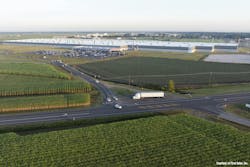First Solar’s Louisiana Plant Boosts American Solar Supply Chain and Energy Goals
U.S.-based photovoltaic module maker First Solar is highlighting its domestic supply chain with its new $1.1 billion manufacturing facility project in Iberia Parish, Louisiana.
The Iberia Parish plant began production of the company’s Series 7 modules in July. Instead of silicon sourced from China or elsewhere globally, First Solar utilizes American-originated materials such as glass from Illinois and Ohio, and steel produced in Mississippi.
First Solar recently detailed plans to spend billions on U.S.-based manufacturing capacity, including $330 million for a Series 6 module finishing plant in South Carolina and more than $1 billion invested in this Louisiana facility. With a 2.4 million square-foot space covering 11 times the size of the New Orleans Superdome, the Iberia Parish plant is touted as employing more than 700 people and is expected to increase First Solar’s annual production capacity by 3.5 GW.
“This is more than just a manufacturing facility. It’s a commitment to American energy dominance, affordable electricity, growth and prosperity,” said Mark Widmar, CEO of First Solar, in a statement. “By competitively producing energy technology in America with American materials, while creating American jobs, we’re demonstrating that US reindustrialization isn’t just a thesis, it’s an operating reality.”
First Solar expects to exceed 14 GW of American manufacturing capacity by 2026. The plant in Gaffney, South Carolina is expected to be completed and operational next year and increase domestic footprint by 3.7 GW, while creating 600 jobs.
In Louisiana, the Iberia Parish plan could elevate the region’s gross domestic product by 4.4% in the first full year of operations. Many of the jobs located there could exceed $90,000 in annual compensation packages.
“First Solar’s investment is already delivering real results for Iberia Parish and the surrounding region with hundreds of good-paying jobs and new opportunities for Louisiana workers and businesses,” said Louisiana Governor Jeff Landry.
The factory is enabled by artificial intelligence (AI), using computer vision and deep learning to automatically detect defects in solar panels during production, while technicians and operators leverage AI-powered tools to make operating adjustments and guide decision making.
“Along with its sister facilities in Ohio and Alabama, this factory demonstrates how AI can be harnessed to help American factory workers reach their full potential,” said Kuntal Kumar Verma, chief manufacturing officer, First Solar. “Our fleet offers proof that AI can help realize productivity gains that allow us to out-innovate the competition and run our operations smarter, better, and faster.”
For many of its module models, First Solar uses materials such as its cadmium telluride composition (CdTe), which was developed as a cost-effective alternative to silicon.
First Solar also has three manufacturing facilities in Ohio and one in Alabama. The company’s research and development centers are in Ohio and California.
Nearly 50 GW of direct-current solar capacity was installed in the U.S. last year, according to the Solar Energy Industries Association. Solar accounted for 66% of all new electricity generation added to the U.S. grid in 2024.
Domestic solar module manufacturing capacity grew an unprecedented 190% year over year in 2024, according to the SEIA.
About the Author
Rod Walton, EnergyTech Managing Editor
Managing Editor
For EnergyTech editorial inquiries, please contact Managing Editor Rod Walton at [email protected].
Rod Walton has spent 17 years covering the energy industry as a newspaper and trade journalist. He formerly was energy writer and business editor at the Tulsa World. Later, he spent six years covering the electricity power sector for Pennwell and Clarion Events. He joined Endeavor and EnergyTech in November 2021.
Walton earned his Bachelors degree in journalism from the University of Oklahoma. His career stops include the Moore American, Bartlesville Examiner-Enterprise, Wagoner Tribune and Tulsa World.
EnergyTech is focused on the mission critical and large-scale energy users and their sustainability and resiliency goals. These include the commercial and industrial sectors, as well as the military, universities, data centers and microgrids. The C&I sectors together account for close to 30 percent of greenhouse gas emissions in the U.S.
He was named Managing Editor for Microgrid Knowledge and EnergyTech starting July 1, 2023
Many large-scale energy users such as Fortune 500 companies, and mission-critical users such as military bases, universities, healthcare facilities, public safety and data centers, shifting their energy priorities to reach net-zero carbon goals within the coming decades. These include plans for renewable energy power purchase agreements, but also on-site resiliency projects such as microgrids, combined heat and power, rooftop solar, energy storage, digitalization and building efficiency upgrades.


